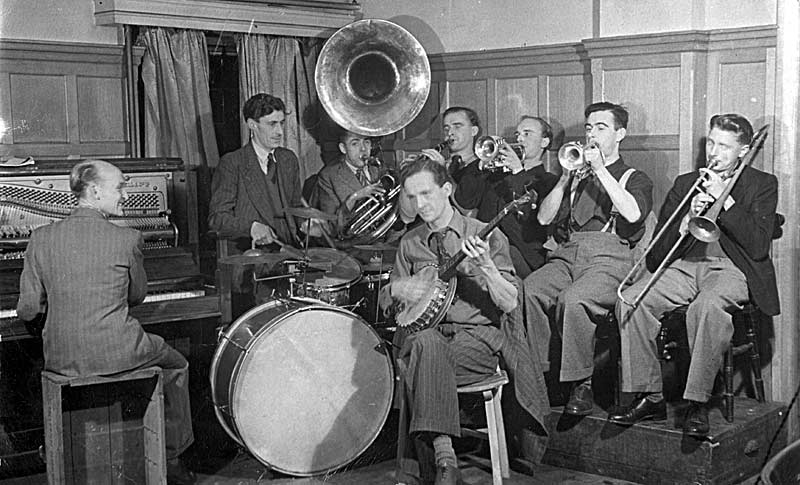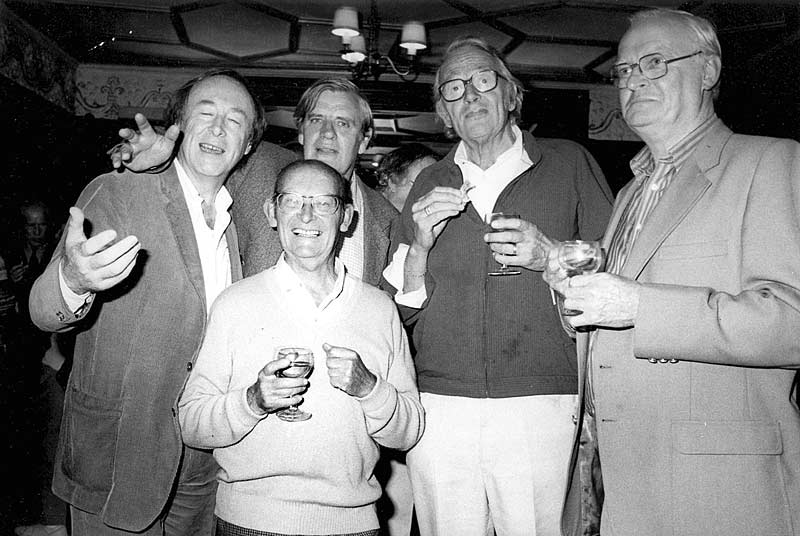
Photograph kindly supplied by Dave Bennett
George Webb
08/10/1917 - 10/03/2010

Photograph kindly supplied by Dave Bennett
12/03/10 - Steve Voce
George Webb died on Wednesday. He was 92. Arrangements were being made for him to attend the Humphrey Lyttelton Memorial Concert at the Hammersmith Apollo on April 25. Appearing there will be sundry Lyttelton musicians including Wally Fawkes, Tony Coe etc., the bands of Bilk and Ball, and Jack Dee and the cast of I'm Sorry I Haven't A Clue.
I'm
going,. too!
12/03/10 - Clarence Henley
Dear Fred, I seem to recollect that George Webb was at one of the last Blackpool Swinging Jazz Parties. I was ill at the time and didn't take my photographic gear but there was a gathering of all the old-timers present - George, Mick Mulligan, Ian Christie, Geoff Cole and others. Dave Bennett has a marvellous photo of the George Webb Band in the Decca Studios in London, recording their first 78's. I remember seeing George for the first time in 1949 when the Humphrey Lyttelton band played a one-off concert at the Onward Hall, Deansgate Manchester. George wore a check shirt (lumberjack style) and a pair of outstanding braces. He was given a great reception. he was also at one or more of the Merseysippi's annual bashes.
13/03/10 - John Petters
George Webb who single handedly launched the BritishTraditional Jazz revival with his Dixielanders during the war passed away on Thursday. I worked with George on many occasions and he will be missed. A thoroughly nice man, George appeared at many of my festivals over the past few years. I have put a modest tribute on the website: www.traditional-jazz.com. (reproduced below courtesy of John Petters))
 92 year old George Webb - known affectionately as the Father of British Traditional Jazz - died on Thursday.
92 year old George Webb - known affectionately as the Father of British Traditional Jazz - died on Thursday.
George - a self taught pianist, fell in love with the classic jazz of Louis Armstrong, Jelly Roll Morton and King Oliver and put together the first traditional jazz revival band in the UK during the War.
The George Webb Dixielanders studied then 20 year old rare 78 rpm recordings and soon had a large following at the Red Barn at Barnehurst.
Humphrey Lyttelton and Wally Fawkes joined the band and eventually Lyttelton took over the leadership.
Defying the law - which prevented American Musicians appearing in Britain, the band recorded with New Orleans saxophonist, Sidney Bechet, which resulted in a court case. George was a key player in the proceedings. The Lyttelton band recorded countless sides for Parlophone with Webb at the piano.
George left in 1951 to become an agent and promoted most of the top Trad bands during the boom. He moved into pop music and blues in the '60s, came close to bringing Elvis Presley to the UK and just missed bagging the first London concert by the Beatles, due to the cheque from the agency for who George worked, written to Brian Epstein bouncing.
He organised a massive jazz festival in the Isle of Man, losing all his money when the venue burnt down. He took a pub in Stansted, Essex, promoting jazz on a smaller scale.
It was there that I first met him in the mid 80s.
I have made a tribute video, which
was filmed by Mark Field during George's appearance at the 2007 Louis Armstrong
Celebration Jazz Festival at South Downs Holiday Village, with a hand picked
band of some of his friends.
Featured musicians are: Chez Chesterman, cornet, Dave Bailey, clarinet, Mike
Pointon, trombone, Keith Donald, bass & John Petters, drums.
George made his final recordings as a member of Humphrey Lyttelton's band in
1951. He didn't record again until 2004 with John Petters and his Hot Five -
"An Evening with George Webb" Rose Records RRCD1031, available from www.traditional-jazz.com
12/03/10 - Adrienne Ferst
R. I. P. George I last spoke to him, probably in the early sixties when he was managing Long John Baldry and they were working the club circuit in the NW. The pianist then was Reggie Dwight Now Elton John. George's life and achievements probably started what became the soundtrack of my growing up and I see old issues of the magazine contain a number of articles about him. I feel it would be a fitting tribute if those articles could be reproduced here, mainly for the benefit of those of us who are old enough to have known him but also for those young enough to not be aware of his enormous contribution to the music.
15/03/10 - Richard Knock
Can I add a small tribute to George? We met him once when we were playing at the 'Sun' in Llangollen Festival some years ago. About 10 minutes into our first set someone nudged me and said 'George Webb just walked in' And he had. We had a lengthy chat with George during the break, receiving encouragement and feeling flattered that this British Jazz Icon should come and listen to us. But what impressed us most was that he stayed for the entire session! Maybe we were having a good day, or maybe he was being his usual kind self - we like to think it was the former! My brother John from down in Kent (trombonist and friend of a number of New Orleans musicians, and, like George, a member of the 'Tibetian Layabouts' jazz fraternity) met George more than once, and recalls an occasion when at the 'Red Barn' pub (where the UK revival could be said to have started), they were having a celebration to mark a 50 year anniversary of George's Dixielanders, and George was presented with a tankard to mark the occasion. John said to George 'Let me be the first to fill it for you' and he was. Small of stature, large of personality and a wonderful musician, we revere his memory and deeply regret his passing.
With acknowledgement to The Telegraph.
The following Obituary appeared on 15th March 2010
George Webb George Webb, who died on March 10 aged 92, is universally acknowledged to be the father of the postwar traditional jazz revival in Britain, serving as an inspiration to, and frequent band member with, the trumpeter Humphrey Lyttelton.
The Dixielanders Photo: JAZZ INDEX The movement Webb created, which grew steadily in the late 1940s, led directly to the "trad boom" of the late 1950s and early
1960s in which he also played a leading part, first as pianist and bandleader and later as agent and promoter.
George Horace Webb was born in Camberwell, south London, on October 8 1917, the son of a music hall artiste. His earliest memories were of his father and uncle (the "Brothers Webb") rehearsing their act at home. The family later moved to Belvedere, Kent, and Webb took a job at the Vickers Armstrong armaments factory in nearby Dartford.
When war broke out in 1939, he was already a skilled machine-gun fitter and thus exempt from the call-up. A keen jazz enthusiast and self-taught amateur pianist, Webb helped organise entertainment in the factory canteen and, in 1940, began assembling a group of like-minded young jazz lovers with the aim of forming a band. The intention was to play in the style of the early jazz masters, whose music they knew well from records.
In 1941, the band acquired a name: "George Webb's Dixielanders", and a regular place to play - the downstairs bar of the Red Barn pub in nearby Barnehurst. Modelled on King Oliver's Creole Jazz Band of 1922 to 1924, their music sounded alien, even barbaric, to ears brought up on crooners and English dance bands.
Webb was fond of recalling the band's first appearance at the Red Barn: "By the time we had finished the first number we were playing to about ten people, the other 50 having fled to the saloon bar upstairs." A sometimes pugnacious character, he once defended the band's honour from a mocking onlooker by striding off-stage mid-performance, landing a heavy blow, then returning to the keyboard.
But the word gradually spread, and over the next six years jazz devotees converged upon their unlikely suburban stage to enjoy the unique experience of hearing jazz in the classic style played live.
One such visitor was Humphrey Lyttelton, newly demobbed Grenadier Guards officer, first-year art student and aspiring jazz trumpeter. He sat in with the Dixielanders and was soon invited to become a permanent member.
As the style took off in the postwar years, a growing network of venues, along the lines of the Red Barn, became established around Britain. There were features in the music press, occasional radio broadcasts, and even recordings.
In 1948, with its members scattering in search of employment, the Dixielanders folded and Webb joined Lyttelton's newly-formed band as pianist. Partly as a result of Webb's pioneering work, Lyttelton quickly found a new audience among the growing student population. In place of the beer-sipping aficionados of the Red Barn, his band played for crowds of youthful dancers at venues in central London, and later around the country. It also recorded prolifically, with Webb's effervescent piano often featured. He was a small man, with tiny hands, which Lyttelton said reminded him of a pair of kittens, scampering up and down the keyboard.
In 1951, observing the growing popularity of revivalist jazz, Webb thought it a good moment to branch out into promoting jazz events. The most successful of these were the Sunday night sessions at the Shakespeare Hotel, Woolwich, which played to packed houses until the early 1960s. In 1955, Webb joined the staff of Jazzshows Promotions, booking bands and singers for the ever-expanding club and concert circuit. Leaving Jazzshows after 10 years, he set up his own management and agency business, numbering rhythm and blues groups as well as jazz bands among his clients.
Webb barely touched the piano during these years, but returned to playing in the early 1970s. He toured Europe as accompanist to the singer Jo Starr and, in 1973, briefly formed a new version of the Dixielanders. In 1974 he took the tenancy of a pub at Stansted, Essex, a move which enabled him combine all his various activities. He ran the bar, booked the entertainment and sat in with visiting bands whenever he felt like it.
In 1985 Webb gave up his tenancy and moved back to Belvedere, close to the scene of his early triumphs. On July 4 of that year he was guest of honour at the unveiling of a plaque at the Red Barn, commemorating his contribution to British jazz. Although officially retired, he resumed playing with gusto. He appeared as guest artist with many bands, formed several temporary outfits of his own, and was always the first to volunteer to perform at a charity event.
In 1998 he took a prominent role in the celebrations of Humphrey Lyttelton's half-century as a bandleader. He continued to play occasionally until the end of his long life and was due to appear, in May, at a show to celebrate the 70th anniversary of his first venture in band leading.
George Webb's wife predeceased him. He is survived by his daughter.

The fairly recent photograph supplied by Dave Bennett, has George with Chris Barber, Eddie Harvey, Humph and Wally